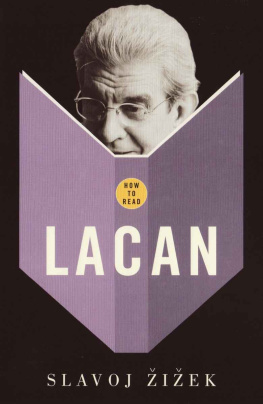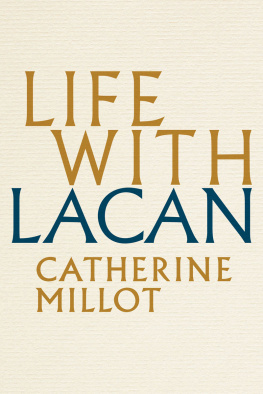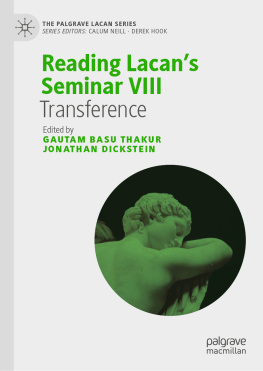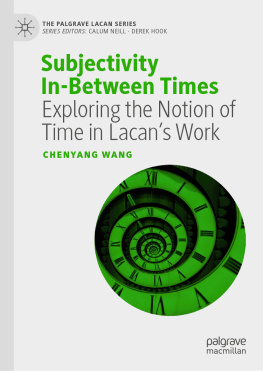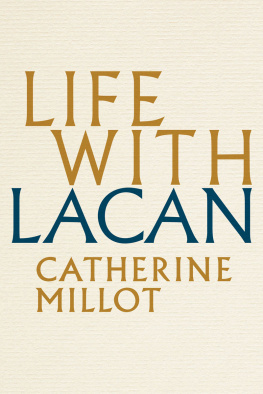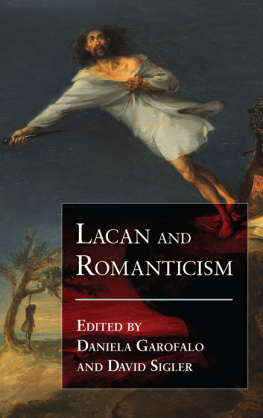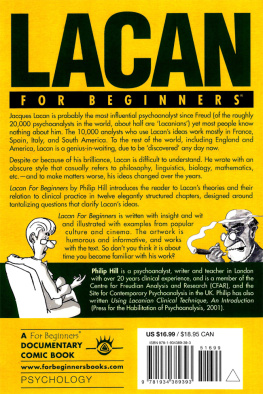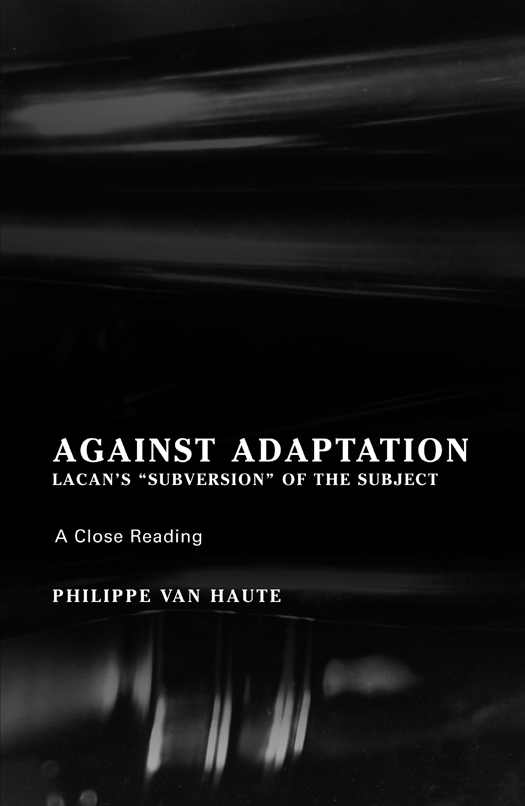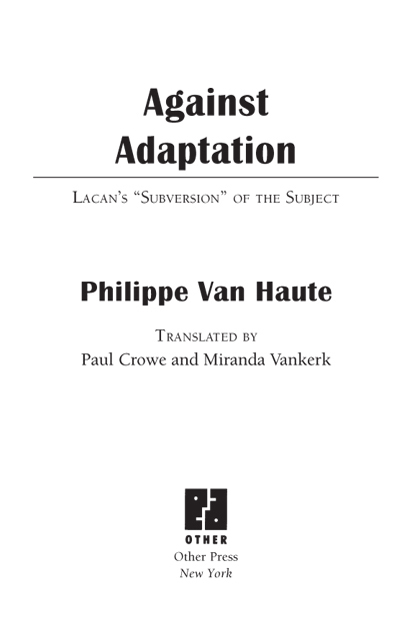T HE L ACANIAN C LINICAL F IELD
A series of books edited byJudith Feher Gurewich, Ph.D. in collaboration with Susan Fairfield
Introduction to the Reading of Lacan:
The Unconscious Structured Like a Language
Jol Dor
Lacan and the New Wave in American Psychoanalysis:
The Subject and the Self
Judith Feher Gurewich and Michel Tort, eds.
The Clinical Lacan
Jol Dor
Hysteria from Freud to Lacan: The Splendid Child of Psychoanalysis
Juan-David Nasio
Lacanian Psychotherapy with Children: The Broken Piano
Catherine Mathelin
Separation and Creativity: Refinding the Lost Language of Childhood
Maud Mannoni
What Does a Woman Want?
Serge Andr
Lacan in America
Jean-Michel Rabat, ed.
Lacan
Alain Vanier
Lacans Seminar on Anxiety: An Introduction
Roberto Harari, translated by Jane C. Lamb-Ruiz
Structure and Perversions
Jol Dor
Against Adaptation: Lacans Subversion of the Subject
Philippe Van Haute, translated by Paul Crowe and Miranda Vankerk
Copyright 2002 Philippe Van Haute
Production Editor: Robert D. Hack
eISBN: 978-1-59051-620-1
All rights reserved. No part of this publication may be reproduced or transmitted in any form or by any means, electronic or mechanical including photocopying, recording, or by any information storage and retrieval system without written permission from Other Press LLC, except in the case of brief quotations in reviews for inclusion in a magazine, newspaper, or broadcast. For information write to Other Press LLC, 2 Park Avenue, 24th Floor, New York, NY 10016. Or visit our Web site: www.otherpress.com.
The Library of Congress has cataloged the printed edition as follows:
Haute, Philippe van, 1957
Against adaptation : Lacans subversion of the subject / Philippe Van Haute.
p. cm.(The Lacanian clinical field)
Includes bibliographical references.
1. Psychoanalysis. 2. Lacan, Jacques, 1901 I. Title. II. Series.
BF173 .H418 2001
150.195092dc21
2001036422
v3.1
For Lut, Dawit, and Eyob
Who cannot see the distance that separates the unhappy consciousnessof which, however strongly it is engraven in Hegel, it can be said that it is still no more than the suspension of a corpus of knowledgefrom the discontents of civilization in Freud, even if it is only in a mere phrase, uttered as if disavowed, that marks for us what, on reading it, cannot be articulated otherwise than the skew relation that separates the subject from sexuality?
Jacques Lacan
Sometimes one seems to perceive that it is not only the presence of civilization but something in the nature of the function itself which denies us full satisfaction and urges us along other paths. This may be wrong, it is hard to decide.
Sigmund Freud
Contents
Foreword
Authors who set out to write an introduction to the work of Lacan inevitably face a difficult choicethey can either give a general introduction that deals with the entirety of Lacans work, or they can concentrate on one or more programmatic texts and attempt to provide a thoroughgoing commentary on them. We already have several introductions of the first type at our disposal.forms a closed system that one can either take or leave. In the second placeand perhaps more importantlyit can unintentionally reinforce the impression many have that the texts of Lacan are unintelligible. Indeed, these texts are infamous for their obscurity and their degree of difficulty; and it is true that many of Lacans texts are difficult to access without the guidance of a commentary. Given that general introductions seldom or never contain extended textual analyses, however, they are often of no real help in reading Lacans work itself. Thus, readers are left with the disagreeable feeling that the texts of Lacan will remain impenetrable for them no matter how many introductions they might read, and they conclude that this oeuvre must be particularly esoteric. If we wish to deliver Lacan from this disrepute, then it is undoubtedly necessary to write introductions and commentaries that pay more attention to the concrete texts and how they can be made intelligible.
Lacan has written several texts of a programmatic nature, and our reasons for doing so are twofold.
First, the text functions as a hinge between Lacans work of the fifties and that of the sixties. In it, Lacan considers to some extent both the concepts that he developed at the beginning of the fiftiesin particular, the categories of the imaginary and the symbolicand those that he worked out chiefly in the sixties, such as the object a, the real, and the phantasy.
Second, in this text Lacan introduces his famous graph of desire, an attempt to render the structure of the subject of desire more perspicuous by graphic representation. Our text is structured around the progressive construction of this graph of desire, allowing the introduction of various fundamental Lacanian concepts (the object a, the phantasy, the phallus, and so on) in relation to each other. We address these concepts and their place on the graph by way of a commentary on the text. It goes without saying, however, that we do not therefore limit ourselves to the passages that have a direct bearing on the graph. On the contrary, we have tried to give a commentary on the whole of Lacans text.
The graph is constructed in four separate stages, each stage implying a further deepening of the problem of subjectivity and of desire. We cannot underline forcefully enough that these four stages have no genetic significance. The graph of desire articulates the structure of desire and of subjectivity, and Lacan in fact rejects any psychogenetic approach to subjectivity in favor of a structural determination of it. The graph is the result of this theoretical choice.
With the aim of keeping the text as readable as possible, we have excluded nearly all quotations. We do, however, quote the passages upon which we comment in extenso in the footnotes. The structure and the thematic of our own text is defined by Lacans text. This, however, has not prevented us from reordering Lacans text in relation to certain themesfor example, the Name-of-the-Father (le Nom-du-Pre) and the phalluswhich Lacan deals with at several different points in his text. We have grouped together the various passages relating to these themes at those points in the argument where they are most significant for the construction of the graph of desirefor it is the construction of the graph that defines the basic structure of Lacans argumentation in Subversion. In this way it has been possible to comment on the greater part of Lacans text ad litteram and to clarify the structure and coherence of Lacans thought.
Our reading of Subversion will above all answer the question of what Lacan understands by the subversion of the subject and how this thematic goes together with the idea of a dialectic of desire. We will thus cast light on the importance of Lacanian metapsychology for psychoanalysis (both theoretical and clinical) on the one hand, and for a philosophical problematic of the subject on the other. That is to say, our reading of this text allows us to clarify the crucial and decisive significance of the metaphor of the Name-of-the-Father and of the castration complex for Lacanian thought. And indeed, in the course of the exposition it will become clear that the metaphor of the Name-of-the-Father and the castration complex form the culminating point of Lacanian psychoanalysis, for it is from them that the various other concepts that determine its structure receive their ultimate significance.


